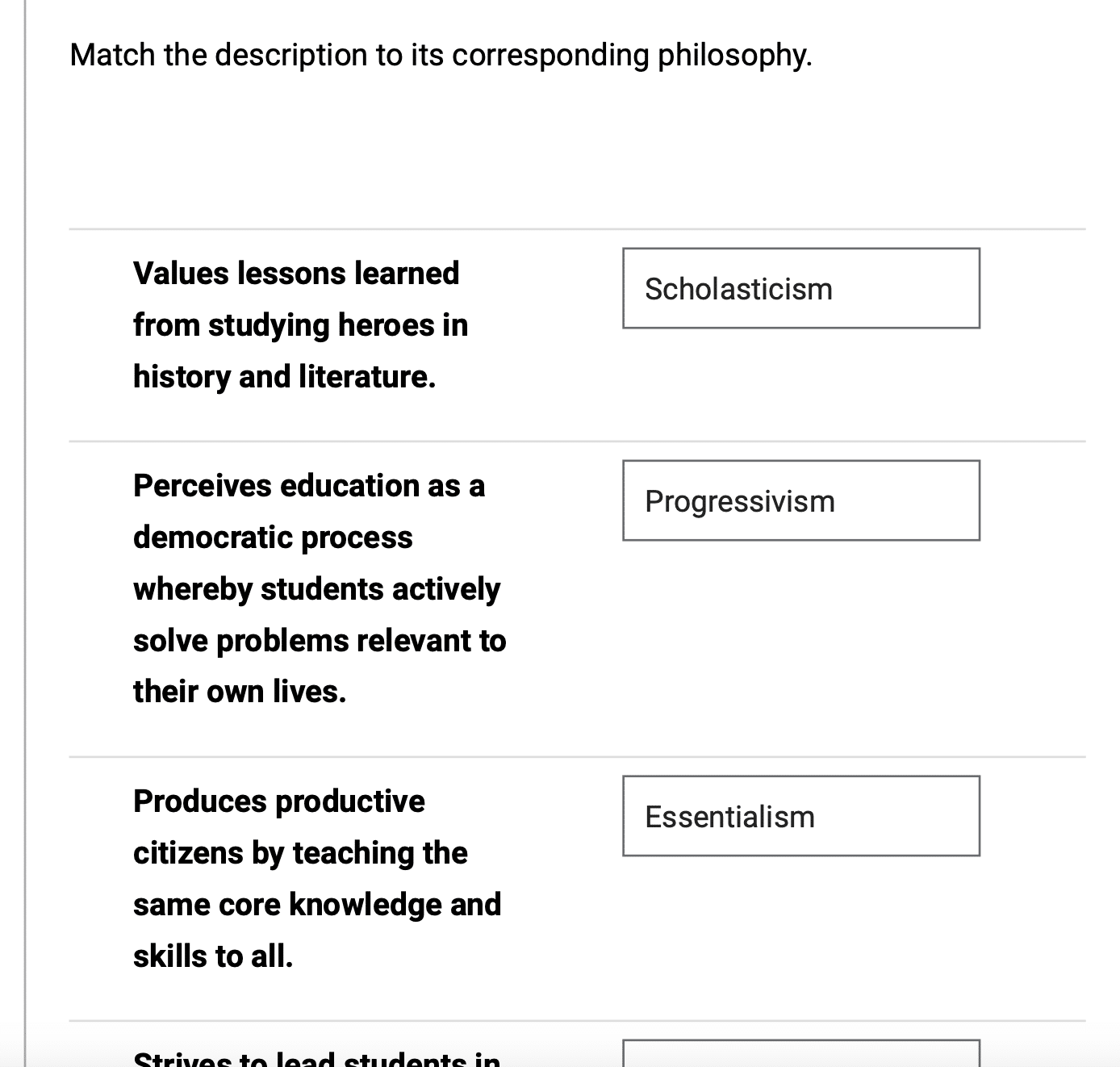EDUC 703 Quiz Terms
EDUC 703 Quiz Terms & Early Western Philosophy
Covers the Textbook material from Module 1: Week 1.
- Match the description to its corresponding term.
- Match the description to its corresponding philosophy.
- Match the description to its corresponding philosophy. Each description follows the stem “Students are successful when they . . .”
- Match each belief with the individuals or groups that best represent the belief.
- Match the denition with the term that best represents it.
- Which philosophy is presented by Plato’s allegory of the cave?
- Which philosophy is represented by Aristotelianism?
- Augustine responded to this classical philosophy by ltering it through a lens of biblical truth and also reached out to pagans by integrating the language of this philosophy into his writings.
- In Augustine’s early medieval era, the trivium of the liberal arts included what academic content? Select all that apply.
- What dichotomy is central to Thomism?
- SHORT ESSAY: Choose one of the options below. Respond in a brief essay of one or two paragraphs (8 points).
OPTION 1: Describe key philosophic beliefs of ancient Athens and compare them to current philosophic trends.
OPTION 2: Which components of Augustine’s beliefs are most critical to his philosophy of education? To what extent do you agree or disagree with Augustine’s philosophy of education? Answer in a brief essay of one or two paragraphs.
OPTION 3: Explain Aquinas’ theory of knowledge acquisition (i.e., epistemology) and the extent to which you agree or disagree with it. Answer in a brief essay of one or two paragraphs.
Set 2
- Match the description to its corresponding term. Unsure if there is a god. Creator God is not currently active with people or the creation. Mixing diverse philosophical beliefs. Questions relating to the nature of truth and how it is acquired. Knowledge deriving from written or spoken words rather than from images. Existence is found only in physical matter that can be quantified. Questions related to what it means to exist or to be. Everything is god. Questions related to purpose.
- Match the description to its corresponding philosophy. Values lessons learned from studying heroes in history and literature Perceives education as a democratic process whereby students actively solve problems relevant to their own lives. Produces productive citizens by teaching the same core knowledge and skills to all. Strives to lead students in rebuilding society into a utopian social order. Seeks to heighten awareness of oppression through Marxist principles. Implements a method of stimulus-response to condition students to excel.
- Match the description to its corresponding philosophy. Each description follows the stem “Students are successful when they . . .” Know and follow natural law in the physical realm. Collaboratively solve social problems. Rely on both faith and reason to comprehend both the natural world and the supernatural realm. Assign meaning to their individual lives. Contemplate abstract ideas of beauty, goodness, freedom, and universal moral law, etc., which leads one to live the “good life” as a good person and citizen.
- Match each belief with the individuals or groups that best represent the belief. Passion and desire inhibit one from finding truth. Education is about the pursuit of happiness; pain, sorrow, and suffering inhibit one from accessing truth. There are no valid truth claims because sensory perception and human reason are awed. Truth is relative.
- Match the definition with the term that best represents it. Porch, where Ancient Athenian philosophers met to dialogue about the latest ideas. Marketplace, where both commodities and ideas were exchanged. Method of questioning and probing students to require them to justify their answers using logic and reason.
- Which philosophy is presented by Plato’s allegory of the cave?
- Which philosophy is represented by Aristotelianism?
- Augustine responded to this classical philosophy by filtering it through a lens of biblical truth and also reached out to pagans by integrating the language of this philosophy into his writings.
- In Augustine’s early medieval era, the trivium of the liberal arts included what academic content? Select all that apply.
- What dichotomy is central to Thomism?
- SHORT ESSAY: Choose one of the options below. Respond in a brief essay of one or two paragraphs (8 points).
- OPTION 1: Describe key philosophic beliefs of ancient Athens and compare them to current philosophic trends.
- OPTION 2: Which components of Augustine’s beliefs are most critical to his philosophy of education? To what extent do you agree or disagree with Augustine’s philosophy of education? Answer in a brief essay of one or two paragraphs.
- OPTION 3: Explain Aquinas’ theory of knowledge acquisition (i.e., epistemology) and the extent to which you agree or disagree with it. Answer in a brief essay of one or two paragraphs.
